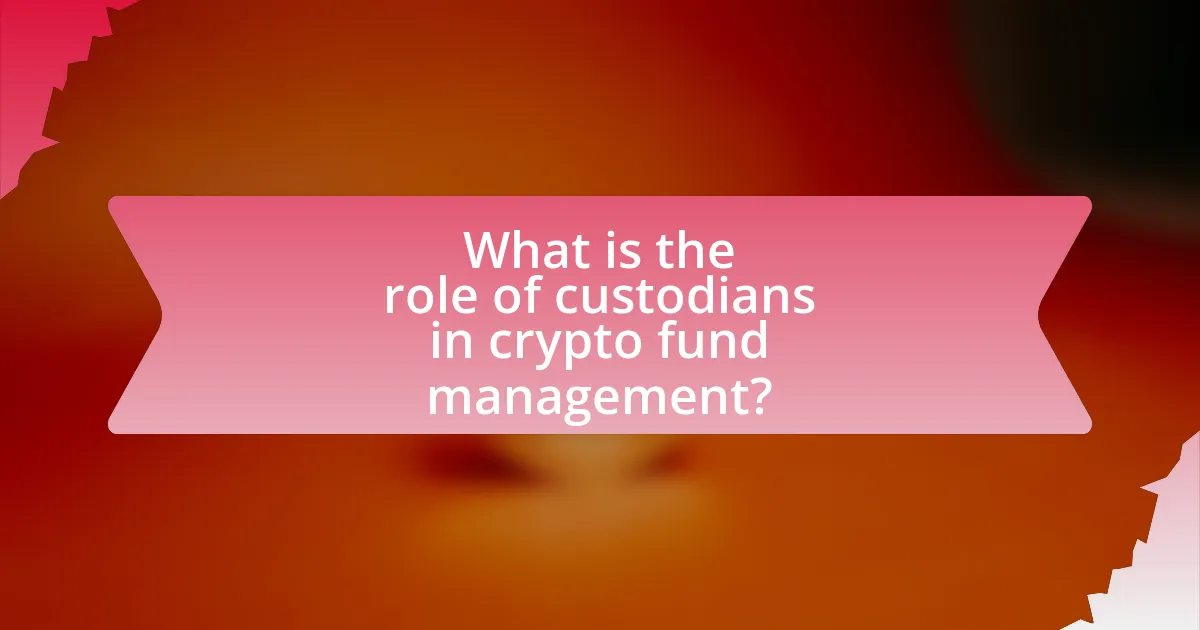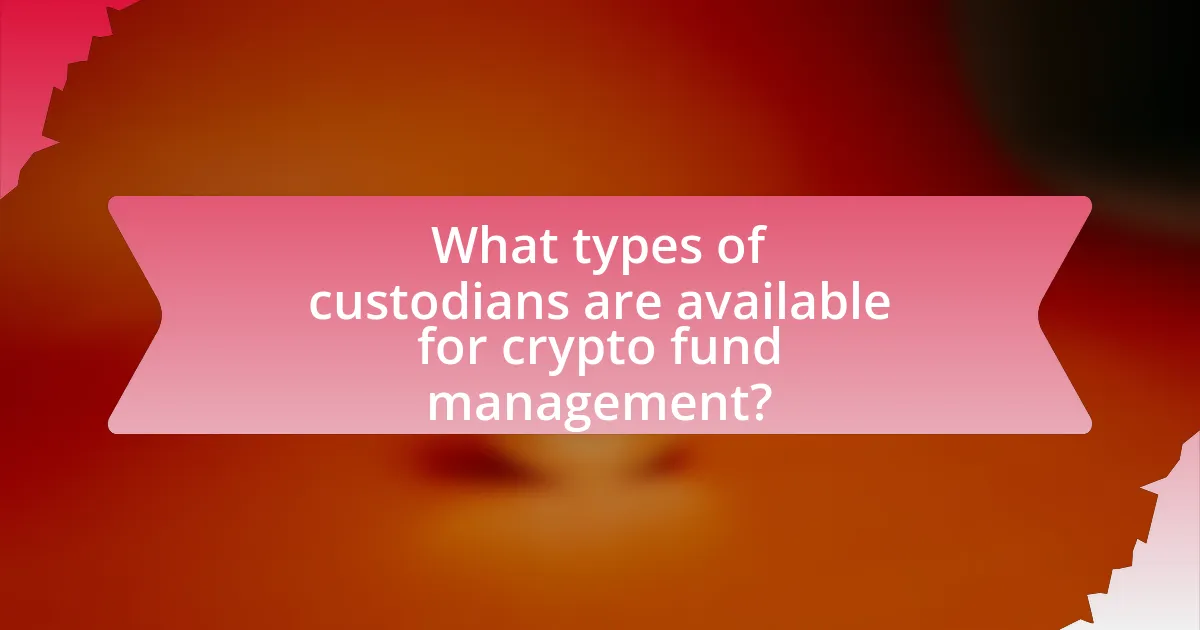Custodians play a crucial role in crypto fund management by providing secure storage and safeguarding digital assets, including cryptocurrencies. They are responsible for holding private keys, facilitating transactions, and ensuring compliance with regulatory requirements, which enhances investor trust and operational integrity. The article explores the various functions of custodians, including risk mitigation, security measures, and the impact of regulatory compliance on their operations. It also examines the different types of custodians available, their unique features, and best practices for crypto funds when selecting custodians to ensure reliable asset management.

What is the role of custodians in crypto fund management?
Custodians in crypto fund management serve as secure storage and safeguarding entities for digital assets. They are responsible for holding private keys, ensuring the security of cryptocurrencies, and facilitating transactions on behalf of fund managers. Custodians also provide services such as compliance with regulatory requirements, reporting, and asset valuation, which are essential for maintaining investor trust and operational integrity. Their role is critical in mitigating risks associated with theft, loss, or mismanagement of digital assets, thereby enhancing the overall security framework of crypto fund management.
How do custodians operate within the crypto fund ecosystem?
Custodians operate within the crypto fund ecosystem by providing secure storage and management of digital assets on behalf of institutional investors and funds. They ensure the safekeeping of cryptocurrencies through advanced security measures, including cold storage solutions, which protect assets from hacking and theft. Additionally, custodians facilitate the execution of trades, manage compliance with regulatory requirements, and provide reporting services to enhance transparency and accountability. The importance of custodians is underscored by the increasing demand for institutional-grade security in the crypto space, as evidenced by the growth of assets under custody, which reached over $60 billion in 2021 according to reports from major custodial firms.
What are the primary functions of custodians in this context?
Custodians in the context of crypto fund management primarily function as secure storage providers for digital assets. They ensure the safekeeping of cryptocurrencies and tokens by utilizing advanced security measures, such as cold storage solutions and multi-signature wallets. Additionally, custodians facilitate the execution of transactions and provide services like asset reporting and compliance with regulatory requirements. Their role is critical in mitigating risks associated with theft and loss, as evidenced by the increasing reliance on custodial services by institutional investors in the cryptocurrency market.
How do custodians ensure the security of digital assets?
Custodians ensure the security of digital assets through a combination of advanced technology, regulatory compliance, and robust operational protocols. They utilize multi-signature wallets, which require multiple private keys to authorize transactions, significantly reducing the risk of unauthorized access. Additionally, custodians implement cold storage solutions, where the majority of digital assets are kept offline, protecting them from online threats. Regulatory compliance, such as adhering to Anti-Money Laundering (AML) and Know Your Customer (KYC) regulations, further enhances security by ensuring that custodians operate within legal frameworks designed to prevent fraud and theft. Furthermore, custodians conduct regular security audits and employ cybersecurity measures, including encryption and intrusion detection systems, to safeguard assets against potential breaches.
Why are custodians essential for crypto fund management?
Custodians are essential for crypto fund management because they provide secure storage and management of digital assets. The inherent volatility and security risks associated with cryptocurrencies necessitate a trusted third party to safeguard these assets. Custodians implement advanced security measures, such as multi-signature wallets and cold storage solutions, to protect against theft and hacking. Furthermore, custodians ensure regulatory compliance, which is crucial for institutional investors, as they navigate the complex legal landscape surrounding cryptocurrencies. Their role in facilitating transactions and providing accurate reporting also enhances operational efficiency, making them indispensable in the crypto fund management ecosystem.
What risks do custodians mitigate for crypto funds?
Custodians mitigate several key risks for crypto funds, including security risks, operational risks, regulatory compliance risks, and liquidity risks. Security risks are addressed through advanced encryption and multi-signature wallets, which protect against hacking and theft. Operational risks are minimized by implementing robust processes for transaction management and asset reconciliation, ensuring accurate record-keeping and reducing the likelihood of errors. Regulatory compliance risks are managed by custodians who stay updated with evolving regulations, ensuring that crypto funds adhere to legal requirements, thus avoiding penalties. Lastly, custodians help mitigate liquidity risks by providing access to various trading platforms and facilitating efficient asset liquidation when necessary.
How do custodians enhance investor confidence in crypto funds?
Custodians enhance investor confidence in crypto funds by providing secure storage and management of digital assets. They implement advanced security measures, such as multi-signature wallets and cold storage solutions, which protect assets from theft and hacking. According to a report by the Financial Stability Board, the presence of regulated custodians can significantly reduce the perceived risks associated with investing in cryptocurrencies, as they ensure compliance with regulatory standards and provide transparency in asset management. This regulatory oversight and security infrastructure foster trust among investors, encouraging greater participation in the crypto market.

What types of custodians are available for crypto fund management?
There are several types of custodians available for crypto fund management, including traditional custodians, specialized crypto custodians, and self-custody solutions. Traditional custodians, such as banks and financial institutions, have begun to offer crypto custody services, leveraging their established infrastructure and regulatory compliance. Specialized crypto custodians, like Coinbase Custody and BitGo, focus exclusively on digital assets, providing enhanced security features tailored for cryptocurrencies. Self-custody solutions allow fund managers to maintain control over their assets by using private wallets, although this approach requires a higher level of technical expertise and security awareness. Each type of custodian serves different needs and risk profiles within the crypto fund management landscape.
How do traditional custodians differ from specialized crypto custodians?
Traditional custodians primarily manage physical assets and securities, while specialized crypto custodians focus on the storage and management of digital assets like cryptocurrencies. Traditional custodians are regulated entities that provide services such as safekeeping, settlement, and reporting for traditional financial instruments, whereas specialized crypto custodians utilize advanced security measures, including multi-signature wallets and cold storage, to protect digital assets from cyber threats. The rise of cryptocurrencies has led to the development of these specialized custodians, which cater specifically to the unique needs and risks associated with digital asset management, ensuring compliance with evolving regulations in the crypto space.
What services do traditional custodians offer for crypto assets?
Traditional custodians offer a range of services for crypto assets, including secure storage, transaction processing, compliance with regulatory requirements, and asset reporting. Secure storage involves safeguarding private keys and digital assets in highly secure environments, often utilizing cold storage solutions to minimize hacking risks. Transaction processing ensures that crypto transactions are executed accurately and efficiently, while compliance services help clients adhere to legal and regulatory standards, such as anti-money laundering (AML) and know your customer (KYC) regulations. Additionally, custodians provide asset reporting services that give clients insights into their holdings and transaction history, enhancing transparency and accountability in crypto fund management.
What unique features do specialized crypto custodians provide?
Specialized crypto custodians provide unique features such as enhanced security protocols, regulatory compliance, and insurance coverage for digital assets. These custodians utilize advanced technologies like multi-signature wallets and cold storage solutions to protect assets from theft and hacking. Additionally, they ensure adherence to regulatory standards, which is crucial for institutional investors, and often offer insurance policies that cover potential losses from breaches or operational failures. This combination of security, compliance, and risk mitigation makes specialized crypto custodians essential for managing digital assets effectively.
What regulatory considerations do custodians face in crypto fund management?
Custodians in crypto fund management face several regulatory considerations, primarily related to compliance with anti-money laundering (AML) and know your customer (KYC) regulations. These regulations require custodians to implement robust identity verification processes and monitor transactions to prevent illicit activities. For instance, the Financial Action Task Force (FATF) guidelines mandate that custodians conduct due diligence on clients and report suspicious activities, which is critical for maintaining regulatory compliance. Additionally, custodians must navigate varying regulations across jurisdictions, as different countries have distinct legal frameworks governing cryptocurrency assets. This complexity necessitates that custodians stay informed about evolving regulations to mitigate legal risks and ensure operational integrity.
How do regulations impact the operations of custodians?
Regulations significantly impact the operations of custodians by imposing compliance requirements that govern asset management, reporting, and security protocols. Custodians must adhere to regulations such as the Securities and Exchange Commission (SEC) guidelines and the Financial Industry Regulatory Authority (FINRA) rules, which dictate how they handle client assets and maintain transparency. For instance, custodians are required to implement robust anti-money laundering (AML) measures and know-your-customer (KYC) processes to prevent illicit activities, which adds layers of operational complexity. Additionally, regulations often mandate regular audits and reporting, compelling custodians to invest in technology and personnel to ensure compliance, thereby influencing their operational costs and efficiency.
What compliance measures must custodians implement?
Custodians must implement several compliance measures, including adherence to anti-money laundering (AML) regulations, know your customer (KYC) protocols, and data protection standards. These measures ensure that custodians can effectively monitor transactions, verify the identities of clients, and safeguard sensitive information. For instance, AML regulations require custodians to report suspicious activities and maintain records of transactions, which helps prevent illicit financial activities. KYC protocols mandate that custodians verify the identity of their clients, reducing the risk of fraud and enhancing overall security. Additionally, compliance with data protection standards, such as the General Data Protection Regulation (GDPR), ensures that custodians handle personal data responsibly and transparently.

How do custodians influence the performance of crypto funds?
Custodians influence the performance of crypto funds by providing secure storage, regulatory compliance, and operational efficiency. Secure storage minimizes the risk of theft or loss, which is critical in the volatile crypto market; for instance, custodians like Coinbase Custody and BitGo have implemented advanced security measures, including multi-signature wallets and cold storage solutions. Regulatory compliance ensures that funds adhere to legal standards, which can enhance investor confidence and attract more capital; for example, custodians often help funds navigate complex regulations, thereby reducing the risk of legal issues. Operational efficiency is achieved through streamlined processes for asset management and reporting, allowing fund managers to focus on investment strategies rather than administrative burdens. These factors collectively contribute to the overall performance and stability of crypto funds.
What role do custodians play in asset liquidity for crypto funds?
Custodians play a critical role in enhancing asset liquidity for crypto funds by providing secure storage, facilitating transactions, and ensuring regulatory compliance. By safeguarding digital assets, custodians reduce the risk of loss or theft, which in turn encourages investor confidence and participation in the market. Furthermore, custodians streamline the process of buying and selling cryptocurrencies, allowing funds to execute trades quickly and efficiently, thereby improving liquidity. According to a report by Deloitte, the presence of regulated custodians can significantly increase institutional investment in cryptocurrencies, as they provide the necessary infrastructure and security that institutional investors require.
How do custodians facilitate trading and asset management?
Custodians facilitate trading and asset management by providing secure storage, transaction processing, and regulatory compliance for digital assets. They ensure the safekeeping of cryptocurrencies and tokens, which is essential for mitigating risks associated with theft or loss. Custodians also streamline the trading process by executing buy and sell orders on behalf of clients, thereby enhancing liquidity and operational efficiency. Furthermore, they assist in asset management by offering reporting services, portfolio tracking, and performance analytics, which help fund managers make informed investment decisions. This role is critical in the crypto ecosystem, as custodians adhere to regulatory standards, ensuring that transactions comply with legal requirements, thus fostering trust and stability in the market.
What impact do custodians have on transaction costs for crypto funds?
Custodians significantly reduce transaction costs for crypto funds by providing secure storage and streamlined transaction processes. By leveraging advanced technology and regulatory compliance, custodians minimize risks associated with theft and fraud, which can lead to costly losses. Additionally, custodians often negotiate better rates for transactions due to their volume and established relationships with exchanges, further lowering costs for the funds they manage. For instance, a study by Deloitte in 2021 highlighted that funds utilizing custodial services experienced up to a 30% reduction in transaction fees compared to those managing assets independently.
What best practices should crypto funds follow when selecting custodians?
Crypto funds should prioritize selecting custodians that demonstrate robust security measures, regulatory compliance, and a proven track record in the industry. Security measures include multi-signature wallets, cold storage solutions, and insurance coverage against theft or loss, which are essential for protecting digital assets. Regulatory compliance ensures that custodians adhere to relevant laws and standards, fostering trust and accountability. A proven track record can be assessed through client testimonials, industry reputation, and the custodian’s history of managing assets without significant incidents. According to a report by the Financial Stability Board, effective custodial practices are crucial for mitigating risks associated with digital asset management, highlighting the importance of these best practices in safeguarding investments.
What criteria are essential for evaluating custodians?
Essential criteria for evaluating custodians include security measures, regulatory compliance, insurance coverage, and operational efficiency. Security measures are critical as they protect assets from theft and cyberattacks; custodians should employ advanced encryption and multi-signature wallets. Regulatory compliance ensures that custodians adhere to legal standards, which is vital for maintaining trust and legitimacy in the crypto space. Insurance coverage is important as it provides a safety net against potential losses, with reputable custodians often carrying significant insurance policies. Operational efficiency relates to the custodian’s ability to process transactions quickly and accurately, which is essential for effective fund management. These criteria collectively ensure that custodians can safeguard assets while complying with regulations and maintaining operational integrity.
How can crypto funds ensure they choose a reliable custodian?
Crypto funds can ensure they choose a reliable custodian by conducting thorough due diligence on the custodian’s regulatory compliance, security measures, and track record. Regulatory compliance is critical; custodians should be registered with relevant authorities and adhere to industry standards, such as the Financial Industry Regulatory Authority (FINRA) or the Securities and Exchange Commission (SEC). Security measures must include robust encryption, multi-signature wallets, and insurance coverage against theft or loss, which are essential for protecting digital assets. Additionally, reviewing the custodian’s history, including client testimonials and any past incidents of breaches or failures, provides insight into their reliability. According to a report by Deloitte, custodians with a strong regulatory framework and proven security protocols significantly reduce the risk of asset loss, making them more trustworthy for crypto funds.















